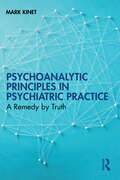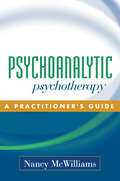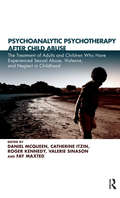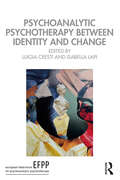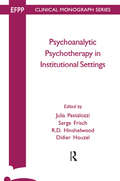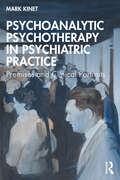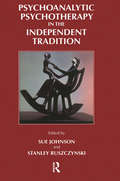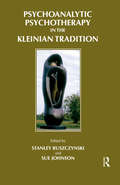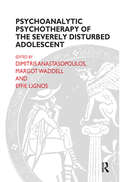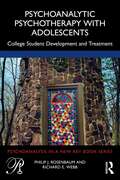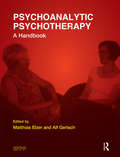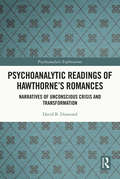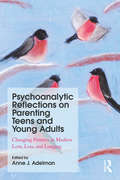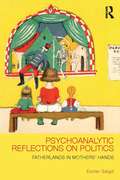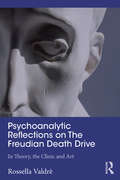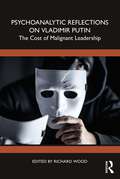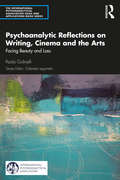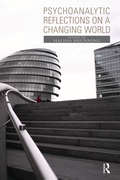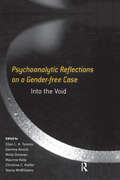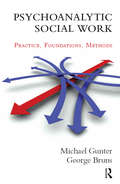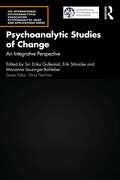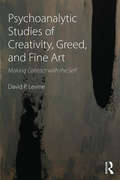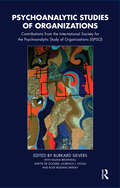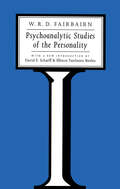- Table View
- List View
Psychoanalytic Principles in Psychiatric Practice: A Remedy by Truth
by Mark KinetIn this approachable book, Mark Kinet offers a unique methodology for integrating psychoanalytic work in the psychiatric setting.Acknowledging the systemic rupture between psychoanalysis and psychiatric treatment, Kinet seeks to bridge the gap and offer a pathway for integrating the disciplines to provide integrative therapy for patients experiencing issues like personality problems, depression, anxiety and trauma. Integrating Freudian, Kleinian, Bionian, Winnicottian, Bowlbyan and Lacanian thought, Kinet provides an overview of psychoanalytic thinking and its benefits in a psychiatric setting. Kinet turns to philosophy, science, art and ethics to encourage a symbiotic relationship between the two disciplines.Written in Kinet's trademark accessible and personable manner, Psychoanalytic Principles in Psychiatric Practice will inspire the training psychiatrist and psychotherapist, as well as the more experienced practitioner, to consider a more panoptic approach to working with patients.
Psychoanalytic Psychotherapy
by Nancy McwilliamsBuilding on the enormous popularity of her two previous texts on diagnosis and case formulation, this important work from Nancy McWilliams completes the trilogy by addressing in detail the art and science of psychodynamic treatment. McWilliams distills the essential principles of clinical practice, including effective listening and talking; transference and counter transference; emotional safety; and an empathic, attuned attitude toward the patient. The author describes the values, assumptions, and clinical and research findings that guide the psychoanalytic enterprise, and shows how to integrate elements of other theoretical perspectives when necessary. She also discusses the phases of treatment and covers such neglected topics as educating the client about the therapeutic process, handling complex challenges to boundaries, and attending to self-care. Presenting complex clinical information in personal, nontechnical language enriched by in-depth clinical vignettes, this is an essential psychoanalytic work and training text for therapists.
Psychoanalytic Psychotherapy After Child Abuse: The Treatment of Adults and Children Who Have Experienced Sexual Abuse, Violence, and Neglect in Childhood
by Valerie Sinason Catherine Itzin Roger Kennedy Daniel McQueen Fay MaxtedThis book presents a coherent and readable narrative review of current views on the effects and role of psychoanalytic psychotherapy in the treatment of children and adults who have experienced childhood abuse and neglect. Recent decades have seen an explosion of research into the extent of child abuse and into the effects of early relational trauma on the developing minds and brains of children. The lasting effects on survivors are increasingly recognized and can be addressed psychotherapeutically. Psychoanalytic Psychotherapy After Child Abuse is unique in two ways. Firstly, in bringing together for the first time the considerable scientific evidence of effectiveness and the vast body of accumulated clinical experience using psychoanalytical approaches in the treatment of people who have experienced childhood abuse. Secondly, in being the product of the widest collaboration of individuals and organizations concerned about the effects of child abuse, and experts on child abuse and psychotherapy. These include experts by experience, survivor groups, activists, academics, and clinicians: paediatricians, physicians, child and adult psychiatrists, psychoanalysts, psychologists, and psychoanalytic psychotherapists.
Psychoanalytic Psychotherapy Between Identity and Change (The EFPP Monograph Series)
by Luigia CrestiPsychoanalytic Psychotherapy Between Identity and Change reconsiders psychoanalytic psychotherapy for contemporary contexts.This book stems from several years of study and research and aims to offer pragmatic and innovative working tools. The contributors approach psychoanalytic psychotherapy as its own practice with distinctive features and benefits to patients. Each chapter considers the history of the field as well as today’s social and cultural context, presenting innovative approaches based on each author’s clinical experience. A range of settings and applications, including online therapy, artistic expression, and psychotherapy with personality disorders, are explored.This book will be of interest to psychoanalytic psychotherapists and psychoanalysts in practice and in training.
Psychoanalytic Psychotherapy in Institutional Settings (The\efpp Monograph Ser.)
by R. D. Hinshelwood Didier Houzel Serge Frisch Julia PestalozziThis book deals with psychotherapeutic life and work at the interface between psychoanalytic theory and institutional reality. It focuses on the set of constraints and pressures which arise as a result of working in institution, and how to deal with them.
Psychoanalytic Psychotherapy in Psychiatric Practice: Premises and Clinical Portraits
by Mark KinetIn this uniquely intimate and clinical book, Mark Kinet explores the vital role of psychodynamic psychotherapy in psychiatric work.Psychoanalytic Psychotherapy in Psychiatric Practice: Premises and Clinical Portraits includes over 70 case studies of patients receiving psychiatric care in various settings, from (semi-)residential treatment to outpatient support. Kinet draws on his extensive experience of conducting group and individual psychotherapy sessions, psychoanalysis in a traditional setting, and his integration of play therapy techniques. He introduces and explores seven foundational premises essential to the success of psychodynamic psychotherapy with these patients: the integration of intrapsychic and interpersonal forces and perspectives, the key impact of unconscious content and processes, the vital importance of the therapeutic relationship, the mobilisation of mentalising capacities, the interpretation of hidden motives, the emancipation resulting from enlightenment, and the importance of approaching this work with realism rather than an idealised perspective. The case studies highlight common mental issues such as anxiety, low mood and clinical depression, PTSD, and personality disorders, equipping the reader with the tools to understand and help a wide range of patients.Written in accessible language, this volume will be of great interest to psychiatrists, psychoanalysts, and psychotherapists, as well as anyone interested in gaining insight into real-life psychiatric practice.
Psychoanalytic Psychotherapy in the Independent Tradition
by Stanley RuszczynskiThis book is a collection of papers to which seven senior members of the British Association of Psychotherapists have contributed. Each essay discusses a problem or impasse the author has encountered in the course of her clinical work with mainly borderline and severely traumatized patients. In this context the writers have all chosen those psychoanalytic concepts, mainly from the Independent psychoanalytic theories but also when appropriate those from Kleinian, Post-Kleinian, Contemporary Freudian and American contributions, that they found useful for the understanding of their patients' often painful psychic states they have brought to therapy. The implications for the transference and countertransference as they have evolved during the treatment process and their technical handling of them are discussed.
Psychoanalytic Psychotherapy in the Kleinian Tradition
by Sue Johnson Stanley RuszczynskiThis set of papers, from members of the British Association of Psychotherapists, demonstrates the vitality of the 'Kleinian tradition' in work with adult patients. It is a picture of work from outside the inner circle of Kleinians in London. And it thus indicates how the concepts have fared in their transport into everyday psychotherapy.
Psychoanalytic Psychotherapy of the Severely Disturbed Adolescent (The\efpp Monograph Ser.)
by Margot Waddell Dimitris Anastasopoulos Effie Laylou-LignosWith chapters written by psychoanalytic psychotherapists from across Europe, and from different analytic traditions, this book shows the common thread that weaves through these different traditions and the serious challenges facing psychotherapists dealing with the future adult generations of Europe.
Psychoanalytic Psychotherapy with Adolescents: College student development and treatment (Psychoanalysis in a New Key Book Series)
by Philip J. Rosenbaum Richard E. WebbIn this book, Philip Rosenbaum and Richard Webb consider the complexities of working as counselors and psychotherapists for college students, and offer a broad and detailed account of the developmental issues essential to understanding adolescent experience. Drawing on existentialism, cultural psychology and relational and object relations theories in psychoanalysis, this book offers a perspective that is sensitive to both clinical concerns and the broader context of college counseling and working with adolescents. Particular attention is paid to the emergence of adolescent identities through a relationship with "otherness," and several considerations are explored as a result. These include the emergence and reconciliation of destructive feelings, suicidal phenomenology and the effects of trauma. By taking a fresh look at clinical developmental theories as they affect adolescents and young adults, Rosenbaum and Webb provide a view of college-student development that is theoretically rich and clinically applicable in a way that warrants renewed appreciation and practice among counselors, psychotherapists and psychoanalysts work with college-age clients.
Psychoanalytic Psychotherapy: A Handbook (The\efpp Monograph Ser.)
by Matthias Elzer Alf GerlachThis book provides a complete and fundamental overview, from a psychoanalytical point of view, on theoretical and clinical aspects of psychodynamic or psychoanalytic psychotherapy. It includes the theory of the human mind, psychic development, psychic conflicts, trauma, and dreams.
Psychoanalytic Readings of Hawthorne’s Romances: Narratives of Unconscious Crisis and Transformation (Psychoanalytic Explorations)
by David B. DiamondOffering innovative, psychoanalytic readings of Nathaniel Hawthorne’s four romances, this volume systematically applies Freudian theory to present significant new insights into the psychology of Hawthorne’s characters and their fates. By critically examining scenes in which the protagonists confront past traumas, Diamond underscores the transformative potential which Hawthorne attributes to encounters with the unconscious. Psychoanalytic narrative technique is employed to interpret the psychogical crises, all hidden by Hawthorne in narrative gaps, in The Scarlet Letter, The House of the Seven Gables, The Blithedale Romance, and The Marble Faun. The protagonists' transformations that are illuminated are crucial to an understanding of the trajectory and resolution of the romances. The text will benefit both academic and non-academic readers who seek a deeper understanding of the psychology of Hawthorne's romances. It will be of particular interest to educators and researchers of applied psychoanalysis and psychoanalytic technique. Since its conclusions challenge many currently held critical views, this volume is especially relevant to scholars of Hawthorne studies, interdisciplinary literary studies, and 19th century American literature.
Psychoanalytic Reflections on Parenting Teens and Young Adults: Changing Patterns in Modern Love, Loss, and Longing
by Anne J. AdelmanPsychoanalytic Reflections on Parenting Teens and Young Adults explores the rich, multi-layered parent-child interactions that unfold during the period of separation and launching. While this is a necessary transitional time, parents inevitably experience feelings of loss and longing for the past as well as hope for the future. <P><P> With honesty, humor, and originality, the book brings together the voices of psychoanalysts, speaking frankly, and not just as professionals, but also as parents grappling with raising young adults in today’s fast-paced world. The contributors reflect on the joys, regrets, and surprises as well as the challenges and triumphs they experience as their children reach the threshold of young adulthood. They address a wide range of topics relevant to parents and practitioners alike-indeed to all those who are closely involved with the growth and maturation of today’s youth. Offering both a broad perspective and an intimate look at present-day parenting dilemmas, the chapters focus on five main areas of interest: raising youth in the digital age, developmental difficulties, evolving gender norms, social concerns and, finally, the building of resiliency. <P><P> Psychoanalytic Reflections on Parenting Teens and Young Adults offers an alternative lens to consider the complex challenges parents face in raising today’s teens and young adults, replacing the customary notion of "failure to launch" with the concept of "holding on with open arms." The explorations in this book advance the idea that in the end, these struggles are essential for growth, buoyancy and wisdom. It will appeal greatly to psychoanalysts and psychoanalytic psychotherapists, as well as family therapists.
Psychoanalytic Reflections on Politics: Fatherlands in mothers' hands
by Eszter SalgóPsychoanalytic Reflections on Politics: Fatherlands in mothers’ hands is a playful exploration of how people’s desires, fantasies, and emotions shape political events and social phenomena. It highlights the mythical sources of today’s political projects, the power of political imagination, and the function of symbolism in political thought. Eszter Salgó argues that the driving force for the formation of political communities is fantasy – ‘illusions’ in a Winnicottian sense, ‘phantasies’ in a Lacanian sense, ‘phantoms’ as described by Nicolas Abraham and Maria Torok, and ‘dreams’ as interpreted by Sándor Ferenczi. She introduces the metaphor of the ‘fantastic family’ as a symbolic representation of political communities, both to reflect on people’s deeply felt desire to find in public life the resolution, love, and wholeness of early childhood, and to unveil the political elite’s readiness to don the mask of the ‘ideal parent’. The book is divided into two parts. The first part of the book explores the theories of Donald Winnicott and Jacques Lacan: the matrimony on the stage of politics between the ‘good-enough mother’ and the Symbolic Father which inaugurates the story of democracy’s ‘fantastic family’. The second part presents the ‘fantastic families’ of selected countries such as Hungary, Italy, and the world community to explain the proliferation of cosmogony projects, and to document the failure of the political elites to offer a satisfactory performance of their maternal and paternal functions. Psychoanalytic Reflections on Politics: Fatherlands in mothers’ hands presents a new way of considering the art of politics, based on the understanding that people perceive reality through imagination and unconscious fantasy. It will be of interest to psychoanalysts, and academics from across the disciplines of politics, psychology, anthropology, sociology, philosophy, literature, and art.
Psychoanalytic Reflections on The Freudian Death Drive: In Theory, the Clinic, and Art
by Rossella ValdrèPsychoanalytic Reflections on The Freudian Death Drive is a highly accessible book that investigates the relevance, complexity and originality of a hugely controversial Freudian concept which, the author argues, continues to exert enormous influence on modernity and plays an often-imperceptible role in the violence and so-called "sad passions" of contemporary society. With examples from cinema, literature and the consulting room, the book’s four chapters – theory, the clinic, art and contemporaneity – investigate every angle, usually little explored, of the death drive: its "positive" functions, such as its contribution to subjectification; its ambiguous relationship with sublimation; the clues it provides about transgenerational matters; and its effects on the feminine. This is not a book about aggression, a type of extroflection of the death drive made visible, studied and striking; rather, it is about the derivatives of the pulsion that changes in the clinic, in life, in society, in artistic forms. With bold and innovative concepts and by making connections to film and books, Rossella Valdrè unequivocally argues that the contemporary clinic is a clinic of the death drive. Psychoanalytic Reflections on The Freudian Death Drive seeks to relaunch the debate on a controversial and neglected concept and will appeal to psychoanalysts and psychoanalytic psychotherapists. Today’s renewed interest in the Freudian death drive attests to its extraordinary ability to explain both "new" pathologies and socio-economic phenomena.
Psychoanalytic Reflections on Vladimir Putin: The Cost of Malignant Leadership
by Richard WoodPsychoanalytic Reflections on Vladimir Putin: The Cost of Malignant Leadership attempts to explore the core psychodynamics that appear to characterize Vladimir Putin’s presidency.Its contributors examine the nature of the leader-follower relationship, the costs of malignant leadership, and the larger historical context in which Putin’s presidency is unfolding. The sobering threat of nuclear war is considered. Finally, the viability and ethics of distance assessment are discussed.This book will be of great interest to psychoanalysts and to readers seeking to understand the complex dynamics of populist leadership.
Psychoanalytic Reflections on Writing, Cinema and the Arts: Facing Beauty and Loss (The International Psychoanalytical Association Psychoanalytic Ideas and Applications Series)
by Paola Golinelli"Why are we so fascinated by beauty?" is a question many of us have asked ourselves, as have many who came before us. This book investigates the moment of ecstatic solitude in which everyone can experience emotions through films, works of art or natural phenomenon, when, even if for a "magic" instant, we feel "alive" and masters of our own Self. Expanding from the author’s personal experience, this book is a series of applied psychoanalytic essays on film, literature, and aesthetic pleasure. It explores the complexity of loss and mourning, destructivity, perversion, and revenge, as well as an exploration of what can facilitate transformation and how to lead a blocked healing process back to motion. This fascinating and insightful book will be of interest to psychoanalysts, psychologists, teachers and students, and all those with an interest in psychoanalysis and the arts.
Psychoanalytic Reflections on a Changing World
by Halina BrunningThis book analyses a range of ubiquitous phenomena that make up our daily lives and to ask, not so much whether psychoanalytic thinking can add to our existing understanding of these phenomena, but what it can add. It deals with work issues independently of each other.
Psychoanalytic Reflections on a Gender-free Case: Into the Void
by Nancy McWilliams Christine C. Kieffer Ellen L. K. Toronto Gemma Ainslie Molly Donovan Maurine KellyThe past two decades of psychoanalytic discourse have witnessed a marked transformation in the way we think about women and gender. The assignment of gender carries with it a host of assumptions, yet without it we can feel lost in a void, unmoored from the world of rationality, stability and meaning. The feminist analytic thinkers whose work is collected here confront the meaning established by the assignment of gender and the uncertainty created by its absence. The contributions brought together in Psychoanalytic Reflections on a Gender-free Case address a cross-section of significant issues that have both chronicled and facilitated the changes in feminist psychoanalysis since the mid 1980s. Difficult issues which have previously been ignored (such as the pregnancy of the therapist or sexual abuse regarded as more than a fantasy) are considered first. The book goes on to address family perspectives as they interact and shape the child’s experience of growing up male or female. Other topics covered are the authority of personal agency as influenced by the language and theory of patriarchy, male-centred concepts that consistently define women as inferior, and the concept of gender as being co-constructed within a relationship. The gender-free case presented here will fascinate all psychoanalysts interested in exploring ways of grappling with the elusive nature of gender, as well as those studying gender studies.
Psychoanalytic Reflections on a Gender-free Case: Into the Void
by Nancy McWilliams Christine C. Kieffer Ellen L. K. Toronto Gemma Ainslie Molly Donovan Maurine KellyThe past two decades of psychoanalytic discourse have witnessed a marked transformation in the way we think about women and gender. The assignment of gender carries with it a host of assumptions, yet without it we can feel lost in a void, unmoored from the world of rationality, stability and meaning. The feminist analytic thinkers whose work is collected here confront the meaning established by the assignment of gender and the uncertainty created by its absence. The contributions brought together in Psychoanalytic Reflections on a Gender-free Case address a cross-section of significant issues that have both chronicled and facilitated the changes in feminist psychoanalysis since the mid 1980s. Difficult issues which have previously been ignored (such as the pregnancy of the therapist or sexual abuse regarded as more than a fantasy) are considered first. The book goes on to address family perspectives as they interact and shape the child’s experience of growing up male or female. Other topics covered are the authority of personal agency as influenced by the language and theory of patriarchy, male-centred concepts that consistently define women as inferior, and the concept of gender as being co-constructed within a relationship. The gender-free case presented here will fascinate all psychoanalysts interested in exploring ways of grappling with the elusive nature of gender, as well as those studying gender studies.
Psychoanalytic Social Work: Practice, Foundations, Methods
by Michael Gunter George BrunsThis book represents the first systematic account of the theory and practice of psychoanalytical social work. For students and those entering the field of social work who are interested in psychoanalytical social work it offers an overview of the diverse fields of practice of psychoanalytical social work and combines this with a description of its history, relation to other areas of social work and relevant psychoanalytical theories. The authors are convinced for this reason that both for students on degree courses as also for social workers and social education workers in further training the book offers an important contribution and fills a gap in this field. Equally, it addresses practising social workers, social educationalists, psychiatrists or psychotherapists offering comprehensive insight into this particular form of social work for those working in centres for counselling or early intervention or in social paediatrics.
Psychoanalytic Studies of Change: An Integrative Perspective (The International Psychoanalytical Association Psychoanalytic Ideas and Applications Series)
by Marianne Leuzinger-Bohleber Erik StänickePsychoanalytic Studies of Change presents recent studies of the process and outcome of psychoanalytic therapy with an integrative perspective.A recurrent challenge in the discussion of therapeutic outcome is the gap between empirical, quantitative studies, reporting results on a group level, and the clinician’s interest in complex mechanisms of change presupposing microanalysis of dynamic interaction processes. This book bridges that gap via dynamic contributions from a variety of authors. Quantitative and qualitative studies are connected, epistemological and conceptual research is emphasized as specific domains, and in-depth clinical case studies are highlighted. The book comprises several new contributions to epistemology and conceptual research, as well as chapters discussing the challenge of combining qualitative and quantitative methods in studying process and outcome.Psychoanalytic Studies of Change will not only meet a need specifically within psychoanalysis for up-to-date research but also provide an overview of the latest empirical research on psychoanalysis for a broader clinical and academic group of readers. It will appeal to psychoanalysts in practice and in training.
Psychoanalytic Studies of Creativity, Greed, and Fine Art: Making Contact with the Self
by David P LevineThroughout the history of psychoanalysis, the study of creativity and fine art has been a special concern. Psychoanalytic Studies of Creativity, Greed and Fine Art: Making Contact with the Self makes a distinct contribution to the psychoanalytic study of art by focusing attention on the relationship between creativity and greed. This book also focuses attention on factors in the personality that block creativity, and examines the matter of the self and its ability to be present and exist as the essential element in creativity. Using examples primarily from visual art David Levine explores the subjects of creativity, empathy, interpretation and thinking through a series of case studies of artists, including Robert Irwin, Ad Reinhardt, Susan Burnstine, and Mark Rothko. Psychoanalytic Studies of Creativity, Greed and Fine Art explores the highly ambivalent attitude of artists toward making their presence known, an ambivalence that is evident in their hostility toward interpretation as a way of knowing. This is discussed with special reference to Susan Sontag's essay on the subject of interpretation. Psychoanalytic Studies of Creativity, Greed and Fine Art contributes to a long tradition of psychoanalytically influenced writing on creativity including the work of Deri, Kohut, Meltzer, Miller and Winnicott among others. It will be of interest to psychoanalysts, psychoanalytic psychotherapists, historians and theorists of art.
Psychoanalytic Studies of Organizations: Contributions from the International Society for the Psychoanalytic Study of Organizations (ISPSO)
by Burkard SieversThis book samples the groundbreaking work that has been developed over the last twenty-five years by psychoanalysts, writers and practitioners associated with the International Society for the Psychoanalytic Study of Organizations (ISPSO). What characterises this collection of original papers is an attempt to look at organizations, groups, teams and organizational role holders using psychoanalytic, systemic and psychodynamic perspectives that collectively eschew superficial, linear, prescriptive and mechanistic views of both the system and the individual within. These papers, delivered as presentations to the Society during the Annual Symposia of the ISPSO from its inception in 1983 to date, collectively form an important commentary on the changing societal dynamics and current preoccupations facing contemporary organizations, their leaders and their workforce. As such, these papers are representative of many that have contributed to, and documented, the development of the thought and praxis from a psychoanalytic perspective and systems thinking over the last quarter of century. Whilst most of these papers have already been published elsewhere, the ISPSO as an organization wished to include them in this volume, recognising their lasting influence and legacy as well as their ongoing impact upon the thinking and the practice of its membership and beyond.
Psychoanalytic Studies of the Personality
by W. R. FairbairnFirst published in 1952, W.R.D. Fairbairn's Psychoanalytic Studies of the Personality re-oriented psychoanalysis by centering human development on the infant's innate need for relationships, describing the process of splitting and the internal dynamic relationship between ego and object. His elegant theory is still a vital framework of psychoanalytic theory and practice, infant research, group relations and family therapy.This classic collection of papers, available for the first time in paperback, has a new introduction by David Scharff and Elinor Fairbairn Birtles which sets Fairbairn's highly original work in context, provides an overview of object relations theory, and traces modern developments, launched by Fairbairn's discoveries.
